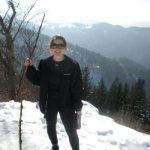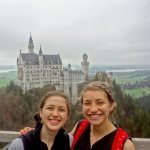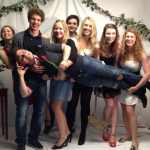Ashley Braunthal (’15) about learning German at Bates
When I enrolled in an overbooked French course at Bates I felt a lurking opportunity to shift gears and try something I always wanted to do: learn German.
I used to overhear German when my grandfather and father chatted on the phone and I’ll never forget my grandfather’s accent when he spoke English. He made sure he kept up with his native tongue through ‘Der Spiegel’ and through his dedicated career in German political science. In the bookshelf next to my bed at home there sat a self-teaching German language book for children with text and illustrations that I indefinitely borrowed from my grandparents’ home. I used to teach myself elementary phrases then try to impress my grandfather with new words. At the time I did not know the magnitude of personal history and struggle attached to his language. This notion of being surrounded by German just always excited me about my heritage. Moreover, his personal hobby of genealogy and also his unchosen fascinating family history inspired me to continue his genealogical work through personal and academic pursuits. The Bates German and Russian studies family granted me this opportunity to connect to my own family history at a much deeper and meaningful level.
I am most grateful for the department’s supportive and dynamic teaching approach. I remember Raluca’s first class vividly. She directed us in German to stand up and sit down, then stand up and sit down. We heard, spoke, and wrote only in German for those hours and very soon we could communicate in basic conversations. My favorite aspect of the course was that Raluca provided us with audio exercises on pronunciation and comprehension, two of the most difficult concepts of language in my experience. As we progressed in levels, we studied many topics that I would have never touched in other history classes: the Transylvanian settlers, east German films, the World Wars from the German perspective.
I took full advantage of the department’s offerings: the courses, native teaching assistant study hour, German Table, and then German Club.
I was so excited about the experience that I eventually took a leadership role in German club and moved forward through the German minor. It was very special to have intimate class sizes and continue on with the professors and students to each level of study. We witnessed each other’s growth and really got to know one another. I found it to be one of my strongest support systems during my four years at Bates because it crossed social and academic boundaries, enriching me and bolstering my intellectual endeavors.
When it came time to decide whether to go abroad and to where, it was a no brainer. I adjusted my schedule for my geology major in order to ensure I could study abroad and gain fluency in German. I decided to study abroad in Freiburg-im-Breisgau, a university city in southwestern Germany. Over there I immersed myself in a new culture and was one step closer to connecting to my roots. In Freiburg, I was part of the IES abroad program and took all of my classes at their center entirely in German. While these courses were integral to my growth, the more exciting aspect of my abroad experience was my living situation. I had the opportunity to be one of a few Americans and the only Jewish person to live in this German catholic dorm, called Alban Stoltz Haus. I loved living there because it was a little student community outside of the city in the black forest. The floors had communal kitchens where we socialized in German. The complex also had fun events and activities available to the residents. For example, I attempted to teach a weekly yoga class in German. The students helped me adjust immediately, were fascinated by my connection to Germany, and were impressed with my language skills. It seemed that they also appreciated foreign students learning their language as a token of cultural understanding. I will always cherish the friends I made in my program and at Alban Stoltz, the currywurst and pretzels, and the spectacular hiking trails hugging the city. It was also special that there were pieces of Bates in my experience including a visit from our first year teaching assistant, classes with Bates students, and a visit to my Bates friend studying abroad in Munich. On top of that, my father somehow persuaded my grandfather to hop on a plane and come one last time to his birthplace. We visited the house where he was born in Gera, Thuringia.
When I got back to Bates the following school year I was so fond of the department and abroad experience that I decided to switch my German minor to a major! It was immensely rewarding to have this flexibility and to demonstrate my progress through a written thesis in German. I worked closely with Raluca to develop a topic and to express it with clarity in the foreign tongue. I incorporated various media in my research to understand the connections between Hitler’s artistry in political rallying and his personal connection to art. I started out with little to no skills in the language and left with a product that served as a milestone of my progress.
Beyond Bates, the language has served meaningful in a practical and personal way.
If I hear anyone speaking it I generally can’t resist and initiate a quick conversation to learn about where they are from. I applied my Germanic language foundation to my Fulbright experience in Norway. It was always helpful for communicating with one of my flat mates who spoke little English, grocery shopping, and navigating the city. I have also used it to interpret documents in my genealogy research. Most importantly, my grandfather lived to speak with me in his native language, read my thesis, and watch me walk across the stage with a degree in his honor.
Vielen Dank Bates German and Russian Studies family for this experience of a lifetime!


